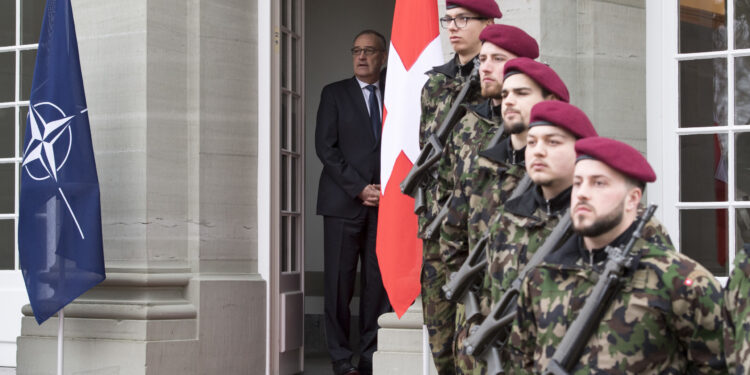“Great power politics, bloc formation and rising regional powers threaten the system of collective security and thus the security of the world…It is undisputed that the global security situation has deteriorated massively, as the system of collective security has been damaged and the political, economic and military dominance of the USA is constantly being challenged by China. A ‘world disorder’ is to be expected for the foreseeable future.”
The commission argues that Europe could fall victim to this global fragmentation: if the centrifugal forces of geopolitics intensify, it could lead to new division and, in the worst case, proxy wars.
It is striking that one of the most sober analyses of the European security situation comes from Switzerland, which by many is seen as the safe, rich, neutral, mountainous country without real enemies, is in no immediate danger, and can position itself slightly outside history. But the commission reminds the reader that threats are connected, especially in Europe – dangers don’t stop at borders, not even mountainous ones, and relying on others for your security could be a losing strategy.
Swiss policy making tends to be slow, even slower than other Western European systems, due to its participative democracy, and, in the case of security and defence policy, a lack of urgency. However, a revised Swiss security policy is to be published by the government by the end of 2025, and the commission’s report will certainly inform its drafting – and its speed.
More importantly, the fact that a large majority of the commission’s members are supporting a fundamental rethinking of Switzerland’s neutrality policy and alliance relationships is a sign of a change in discussions around neutrality. Russia’s full-scale invasion of Ukraine in 2022 has led many European neutral or non-aligned countries to question their position. Finland and Sweden abandoned their status completely, joining NATO in 2023 and 2024 respectively.
Europeans should take note that even in safe, hidden Switzerland history has returned
Support for Swiss neutrality remains strong. While the recommendations of the commission were supported either by “a majority” or “a strong majority”, there were minority views which argued in favour of Switzerland becoming more restrictive. For example, on arms exports, the report notes that a minority suggested Switzerland completely renounce its export-oriented arms industry altogether, “as arms exports repeatedly trigger fierce domestic political debates and damage Switzerland’s reputation abroad.” Russia’s invasion of Ukraine and the changing geopolitical context have deeply rattled Switzerland’s view of the world and its place in it. That Russia has officially proclaimed it no longer considers Switzerland neutral because the country applies EU sanctions against Russia may have also encouraged the Swiss rethinking their policies. Fast changes seem unlikely, but as the world becomes less secure, one can wonder whether a Swiss Zeitenwende, or turning point,might eventually be on the table. At a minimum, other Europeans should take note that even in safe, hidden Switzerland, history has returned. The world has changed and all need to act accordingly.
[1] These 25 countries were taken from an existing list which can receive Swiss weapons without needing special permits. They are NATO and EU countries, plus Argentina, Australia, Japan and New Zealand.
The European Council on Foreign Relations does not take collective positions. ECFR publications only represent the views of their individual authors.
Source link : https://ecfr.eu/article/breaking-tradition-why-russias-war-is-making-switzerland-question-its-neutrality/
Author :
Publish date : 2024-10-03 14:37:42
Copyright for syndicated content belongs to the linked Source.


